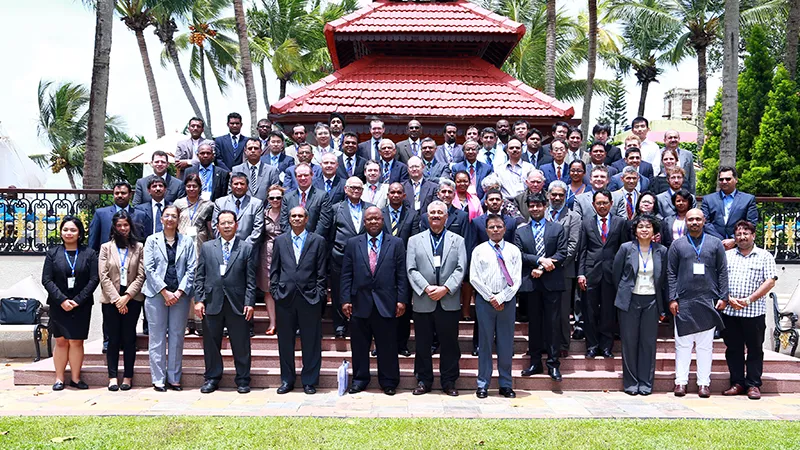-
CENTRES
Progammes & Centres
Location
Noting that maritime disputes and strategic competition in the Indian Ocean are at the core of changing geo-politics in the IO, participants of the Indian Ocean Dialogue concluded that the members of the IORA should address the security concerns themselves rather than relying on international forces.

There is a need to strengthen the identity of the Indian Ocean community and build on a ’common vision with a shared destiny’. This was the unanimous viewpoint of the participants of the Indian Ocean Dialogue, organised by Observer Research Foundation and the Ministry of External Affairs in Kochi, Kerala on September 5-7.
The dialogue, aimed at deliberating policy issues challenging maritime security in the Indian Ocean, was attended by 67 officials and representatives from academia, think tanks and civil societies from 24 countries.
|
Indian Ocean Dialogue |
The discussions were held under six broad themes: Growing Strategic Salience in the Indian Ocean Region (IOR), Maritime Security Challenges in the IOR, Enhancing Regional Cooperation in the IOR, Information Sharing, Maritime Capacity Building for HADR & Disaster Management and Economic Development & Trade Integration.
On the first day of the dialogue, the participants of the closed door meeting acknowledged the changing geo-political contours of the IOR and the emergence of new regional security architecture. They acknowledged the unfolding political turmoil in the region and emphasised on regional cooperation to maintain peace and stability. It was noted that maritime disputes and strategic competition in the Indian Ocean (IO) are at the core of changing geo-politics in the IO. After much deliberation, the participants concluded that the members of the Indian Ocean Rim Association (IORA) should address the security concerns in the IO themselves rather than relying on international forces.
In the second session, the participants deliberated and put forward recommendations on maritime security challenges in the region. Participants agreed on the need to prioritise the challenges in the region as there are not enough resources to address them all together. Countering maritime piracy and protection of Sea Lines of Communications (SLOCs) were identified as the two of the most pressing and immediate concerns in the IOR. The discussion noted that information sharing is key to counter piracy operations in the IOR. While it was emphasised that the presence of armed personnel onboard merchant vessels is the most cost effective method of combating piracy, the need to formulate a legal framework surrounding the same resounded through the discussion. The participants also noted that concerns are different on different sides of the IO based on the sub regional challenges in the IO.
Session three focussed on regional cooperation in the IOR. The participants noted that increasing strategic competition between regional powers is challenging maritime cooperation in the IOR. The discussion threw light on the following issues challenging regional cooperation; that even though the potential in the region is significant, the diversity of the IOR cannot be underestimated; there is a lack of ownership from stakeholders in the IOR; and that there is a need to engage with IORA dialogue partners at a more significant level. The participants suggested that the Indian Ocean Naval Symposium (IONS) serve as a broader platform discussing security cooperation on the IOR. The Regional Cooperation Agreement on Combating Piracy and Armed Piracy against ships in Asia (ReCAAP) model was discussed and recommendations were made for a similar centre to be established in the IOR. The discussion highlighted the need to perhaps elevate the dialogue to a summit level discussion and for IORA to acquire the mandate to pass legally binding agreements.
The second day of the dialogue began with discussions on information sharing. As touched upon briefly in session two, the participants acknowledged that intelligence and information sharing are crucial in combating piracy in the IO. ReCAAP in Southeast Asia is the best example on information sharing addressing maritime challenges. The participants noted that the implementation of patrols, following the Best Management Practices, presence of armed guards and situational awareness has contributed toward the success of anti-piracy operations.
Session five discussed maritime capacity building and disaster management. The discussion underlined the need to establish standard operational practices throughout the region to address Humanitarian Assistance and Disaster Relief (HADR). To that end, there is a need to establish a regional funding centre in the IO to address the challenges in HADR. The participants noted that capacity building is necessary in addressing maritime challenges in the IO and HADR is an area that all countries must work together on. The session also underlined the importance of research in addressing ocean disasters in the IOR and that there are many country specific disasters that needs to be mapped. The participants voiced that creating a framework with standard protocols on disaster management is essential in the region
The final session was on economic development and trade integration. The participants in this session discussed the need to focus on infrastructure development especially of ports along the IO to facilitate trade integration. Along with science and technology, the participants also agreed on the need to promote trade among IORA countries. The discussion also noted that while the Maritime Silk Route initiative can promote economic integration of the region, the lack of transparency in the details of the project is restricting nations from joining the initiative.
At the end of the discussions, the participants committed to prioritise on the issues raised during the dialogue and work toward building mechanisms to address them.
(This report is prepared by Darshana M. Baruah, Junior Fellow, Observer Research Foundation, Delhi)
The views expressed above belong to the author(s). ORF research and analyses now available on Telegram! Click here to access our curated content — blogs, longforms and interviews.